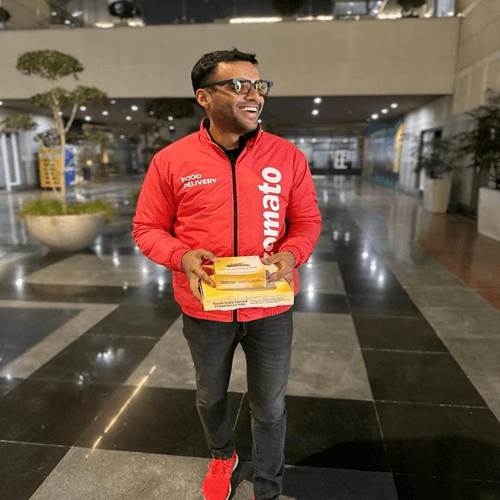The Accidental Startup: How Zomato Overcame Hurdles and Achieve Global Success
A startup like Zomato has created numerous jobs, but do you know it faced a series of hurdles on its journey to success? Surprisingly, Zomato is an accidental startup that was initially not planned to become this big. Despite the challenges, its unexpected rise to prominence showcases the resilience and determination of its founders. From navigating funding obstacles to scaling operations internationally, Deepinder's and Zomato's journey is a testament to overcoming adversity and achieving remarkable growth.
Finding multibagger stocks is important for building wealth. Discover potential multi-baggers at Sovrenn Discovery.
Early Life and Education
Deepinder Goyal was born in January 1983 in Punjab. His childhood was steeped in the values of hard work and perseverance. He belonged to a middle-class family of Muktsar City Punjab. He did his schooling from Muktsar. His childhood was good and funny, when he was in school he used to barely pass the exam till 7th. He even failed in class 5th.
He didn't have any friends because he wasn't good at studies. In 8th standard, he first stood 3rd in class due to the help of his teacher in exams. He got a lot of attention. This was the first time he felt such attention. Later he started studying and scoring at least better marks. When he went for IIT coaching he was scared to crack the exam and decided to give the exam just for trial. But the result surprised everyone that he cleared the exam.
Deepinder Goyal pursued a degree in Mathematics and Computing at Indian Institute of Technology (IIT) Delhi. His knack for problem-solving and innovation became evident during his time at IIT, where he engaged in various tech projects. After graduating in 2005, Goyal joined Bain & Company, a global management consulting firm. His stint at Bain provided him with invaluable insights into business operations and strategies, fueling his desire to create something impactful with technology.
Investing has built huge wealth for several HNI investors. Learn investing FREE OF CHARGE at Sovrenn Education
The idea of Zomato
The idea for Zomato came in 2008 when Goyal and his colleague Pankaj Chaddah faced the challenge of finding reliable restaurant information. They were frustrated with the lack of a comprehensive restaurant directory, so they decided to create one for themselves. Originally named "Foodiebay," the platform aimed to provide users with accurate and detailed information about restaurants, menus, and reviews. In just the time span of nine months, their start-up up FoodieBay became the largest restaurant directory in NCR.
In 2010, Zomato came, after rebranding from the food directory website Foodiebay. After Zomato’s success in Delhi-NCR, the company started expanding to cities like Pune, Ahmedabad, Bengaluru, Chennai, and Hyderabad. By 2012, Zomato had started expanding overseas, in countries like Sri Lanka, South Africa, UK, UAE, Qatar, and the Philippines. In 2013, it went to New Zealand, Turkey, and Brazil.
In its early years, Zomato faced numerous challenges, from securing funding to building a user base. Goyal's determination, never giving up attitude and strategic decision-making played a pivotal role in overcoming these hurdles. The platform expanded rapidly, not only in India but also internationally. Goyal's foresight led Zomato to diversify its services, incorporating food delivery and online ordering to meet evolving consumer needs.
In 2014-15, To strengthen its position abroad, it also began aggressively acquiring rival companies. After a slow 2016, Zomato saw a further decline in revenues, the company opted to scale back operations in nine of the countries it had expanded to and managed them remotely to make sure it did not miss out on the markets. Today, Zomato is present in over 24 countries worldwide. Through strategic acquisitions and collaborations, Zomato has become a front-foot player in the global food-tech arena, competing with well-established pillars in the market. Goyal’s commitment to customer-centric innovation, a keen eye for market trends, and strategic expansion have pivoted the unprecedented success of his brand.
Also Read: 50 Famous and Wealthiest Cricketers of India
Cofounder Pankaj Chaddah played a significant role in the company and gave wings to many of Zomato’s new initiatives like Zomato Gold and its cloud kitchen concept. In 2018, Pankaj Chaddah left Zomato and continued to own his stake of 3.11% in the company.

A significant milestone in Goyal's entrepreneurial journey was Zomato's IPO (Initial Public Offering) in 2021. The IPO marked the company's entry into the stock market and attracted widespread attention and investment. Goyal's vision for Zomato continues to evolve, with a focus on technological advancements, sustainability, and enhancing the overall dining experience for users.
Deepinder Goyal's journey from a middle-class upbringing to the helm of a globally recognized company serves as an inspiration for aspiring entrepreneurs. His commitment to excellence, resilience in the face of challenges, and innovative thinking have left an indelible mark on the India business world.
Recently, Goyal has gained further popularity with his appearance as an investor on Shark Tank, an Indian reality show, where he continues to inspire and support budding entrepreneurs. Deepinder Goyal’s story is one of vision, perseverance, and innovation. From the classrooms of IIT Delhi to the global stage, his journey encapsulates the spirit of entrepreneurship.
His commitment to creating a platform that not only meets consumer needs but also adapts to the changing market dynamics has made Zomato a household name. Goyal’s footprint as the mastermind behind Zomato’s success has carved its story in the archives, serving as a beacon of inspiration for future generations of entrepreneurs.
Also Read: Vineeta Singh’s Journey : Rejected by 100 VC, made a company worth over 500 crore "Sugar cosmetics"

